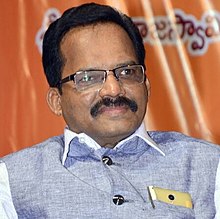Deerghasi Vizai Bhaskar
Deerghasi Vizai Bhaskar | |
|---|---|
 Vizai Bhaskar Deerghasi | |
| Born | 1958 (age 65–66) Ampolu, Srikakulam district, Andhra Pradesh |
| Nationality | Indian |
| Other names | Vijaya Bhaskar |
| Occupation(s) | former Director, Culture Department, Government of Andhra Pradesh |
| Years active | 1982-present |
| Known for | Theater arts, playwright |
Dr. Deerghasi Vizai Bhaskar, born in 1958 in Ampolu village, Srikakulam district, Andhra Pradesh, hails from a poor family. He began writing dramas at the age of twenty-two, with his debut play Turpu Tellanrindi, which depicted the struggles of weavers. Though he initially started his literary career writing short stories, on the advice of Kalipatnam Master, he transitioned to playwriting under the guidance of S.K. Misro, a veteran stage director. His passion for theater led him to pursue academic research in the field, culminating in a thesis on Bertolt Brecht's influence on Telugu drama.[1][2]
Literature
[edit]Dr. D. Vizai Bhaskar imbibed a spirit of democratic struggle against social and political oppression rooted in caste, demography, and the political system. He draws his themes from the agony of human suffering prevalent in rural society. Often, he employs mythopoeic and folkloric concepts to awaken rural communities, as their cultural foundations are deeply rooted in the perceptions of the past. Bhaskar also utilizes a powerful sense of humor, with shades of satire, to inspire and provoke people towards the effective realization of their goals. He views drama and theater as powerful tools for social change.
His sense of social commitment and responsibility has earned him several awards, including six Nandi Awards at the state level for best playwriting and the prestigious Central Sangeet Natak Puraskar in 2010. Many of his plays have been translated into several Indian languages, including Kannada, Tamil, Hindi, Gujarati, Bengali, Manipuri, Malayalam, and English, and have received equal appreciation and acclaim from diverse audiences. It is no exaggeration to say that he has emerged as a powerful pan-Indian playwright of recent times.
Recognition
[edit]Vizai Bhaskar's dramas were adopted by the Karnataka Nataka Akademi in 2010 to be performed on stage as part of a Kannada-Telugu theater collaboration.[3] In an interview with The Hindu, Bhaskar mentioned that his play Gandhi Jayanthi was translated into seven languages, in addition to English, and that his drama Puli Swari was staged 150 times.[4]
Awards
[edit]- Nandi Awards : Best Writer Award for the years 1999, 2000, 2003, 2004, 2005, 2009, and 2011[6]
- Sri Potti Sreeramulu Telugu University Award in 2004
- Sangeet Natak Akademi Award for Best Playwright in 2010[7]
- Delhi Telugu Akademi Award for Excellence in Telugu Literature in 2011
- Gurajada Sahitee Puraskaram in 2012, conferred by the Government of Andhra Pradesh
References
[edit]- ^ "D. Vizai Bhaskar". sangeetnatak.gov.in. Retrieved 4 August 2019.
- ^ "Natakotsav". The Hindu. 17 March 2009. ISSN 0971-751X. Retrieved 4 August 2019.
- ^ Staff Reporter (9 June 2010). "Kannada-Telugu theatre festival". The Hindu. ISSN 0971-751X. Retrieved 4 August 2019.
- ^ Srihari, Gudipoodi (24 February 2012). "Icon of Telugu theatre". The Hindu. ISSN 0971-751X. Retrieved 4 August 2019.
- ^ "List of awards displayed on personal website". Archived from the original on 4 August 2019. Retrieved 4 August 2019.
- ^ RAVIKUMAR, ARUNA (31 March 2019). "Exploring the vast canvas of theatre". www.thehansindia.com. Retrieved 4 August 2019.
- ^ Jha, Manisha (23 July 2011). "Sangeet Natak Akademi fellowship for Girija Devi, T.K. Murthy, Dagar". The Hindu. ISSN 0971-751X. Retrieved 4 August 2019.
External links
[edit]- Personal Website Archived 4 August 2019 at the Wayback Machine
- Vizai Bhaskar's interview in DD Saptagiri, national network of India
- Kaalakutam[1]
- Deergasi Vizai Bhaskar’s Ruthwik[2]
- A Deeper Insight on Social Apprehension and Humanity[3]
- The Element Of Social Concern In The Plays Of Vizai Bhaskar [4]
- A Call for Social Change[5]
- Sootha Theatre, A Critical Analysis[6]
- The Return of Gandhi[7]
- SOOTHA RANGASTALA[8]
- The Role of Women Characters in select plays of Vizai Bhaskar[9]
- The Chair[10]
- Puliswari-Raising the Tiger[11]